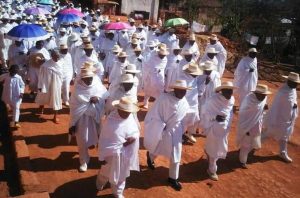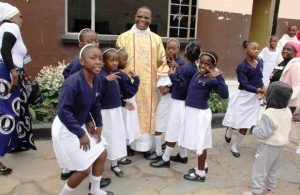A meal a day at school. This is the challenge of “Mary’s Meals”, a Scottish NGO active in international solidarity. Sometimes it takes but a little, to give hope to many children.
This is the story of Magnus MacFarlane-Barrow, a Scottish layman who has set up, in a shed at his home in Argyle, an organisation that offers a daily meal at school to almost 1,200,000 children in twelve of the world’s poorest countries.
It is called Mary’s Meals – a name that reveals the importance of the faith in this story. It finds its roots in a trip that Magnus made with his family to Medjugorje in the mid-eighties – that was the beginning of spiritual renewal for the MacFarlane-Barrows but also a great story of generosity. Struck by the images of the sufferings of the victims of war in Bosnia in 1992, Magnus decided not to remain indifferent. He organised collections of essential goods; he got everything together in a shed close to his home and, together with his brother, left for Medjugorje where they distributed the aid. But then, when they returned home, they were surprised that the generosity was unstoppable. Fresh supplies continued to arrive for the initiative that began purely by chance.
It was then that Magnus decided to leave his job at a fish farm and dedicate himself full-time to his new work of solidarity with the poor. There followed many more trips to Bosnia, then to Romania, and to the humanitarian emergency in Liberia, and countless other frontiers of charity.
The end result was Mary’s Meals, which began in Malawi in 2002. They were taking aid to a village struck by famine when Magnus met Emma, a young, seriously ill mother. “She was dying of AIDS, lying in her hut surrounded by six small children. She said she could only pray that someone would look after them after she was gone. He asked the eldest child, Edward, what he wanted to be when he grew up. His reply was simple, ‘I just want enough food and to go to school'”.
For Magnus, that reply became a programme, to guarantee every child a daily meal while attending school. It was a strategy that only appeared to be minimal – joining food and education is, in fact, the key to building the future. According to official UN statistics, there are today around 61 million children between the ages of six and eleven who receive no schooling. With his initiative, Magnus MacFarlane-Barrow reduced these numbers considerably, thanks to a project which, though it has now become a worldwide movement, has been able to adhere to its sober roots planted in the Scottish countryside.
At the end of 2016, there were 1,187,000 places at a table prepared in schools by the volunteers of the organisation in twelve countries of Africa, Asia, the Caribbean, Eastern Europe and Latin America. In Malawi – in particular – just fifteen years after Magnus met Emma, 800,000 children in primary schools can count on a daily meal provided by Mary’s Meals.
This is an achievement rendered possible by a network of 65,000 home-based volunteers, thanks to whom it costs the NGO only €14, 50 to feed a child for one school year. And all this is happening in one of the most difficult frontiers in the fight against hunger. Last year, drought struck Malawi very hard. In a report issued just four months ago, the FAO estimated that the problem affected 23 of the 25 districts of the country and that the number of people in urgent need of food was 6.5 million. And there was more at stake than just food – “Generally” – recounted Irene Kaferapanjira, a teacher in a school where the programme was launched in 2008 – the children were not coming to school and, even when they did come, they were so hungry that it was impossible for them to learn anything.
Now it is just the opposite. Thanks to this programme, a growing number of children are attending school, with very good results. Today, Magnus MacFarlane-Barrow – married to his wife Julie and with seven children – is known all over the world. However, his trademark is that of simplicity and concreteness together with the quiet presence of Mary the Mother of Jesus who gave the organisation, open to all, its name. To all, without distinction she brings her tenderness.






